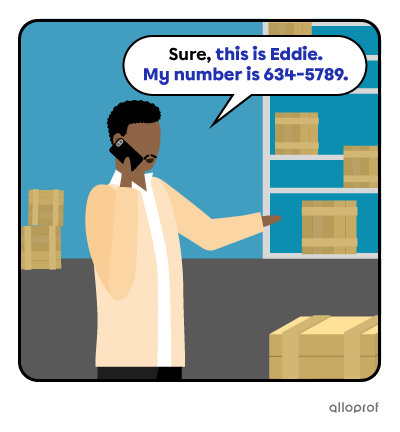A conversation is 2 or more people talking together.
The context and the people involved in a conversation affect the language used. Generally speaking, conversations can be formal or informal.
Formal conversations are official and impersonal.
Formal Conversation Contexts |
| Job interview |
| Giving a speech |
| First time meeting someone |
| Official ceremonies |
Informal conversations are casual with people we know.
Informal Conversation Contexts |
| Chat with friends/family |
| Dinner parties |
| Game night |
| Talking with coworkers you know well |
Greetings are used to begin a conversation.
Used both in formal and informal conversations.
| Hello |
| Hi |
| Good morning |
| Good afternoon |
| Good evening |
| How are you? |


Formal greetings are impersonal and keep a certain distance between the speakers.
| It is a pleasure to meet you |
| How do you do? |
| Nice to meet you |
| Pleased to meet you |


Informal greetings are casual and used with people we know very well.
| Hey! |
| Yo! |
| What’s up? |
| Good to see you! |
| Long time no see! |
| What’s new? |
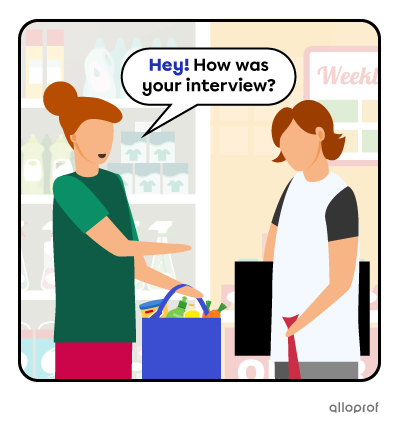
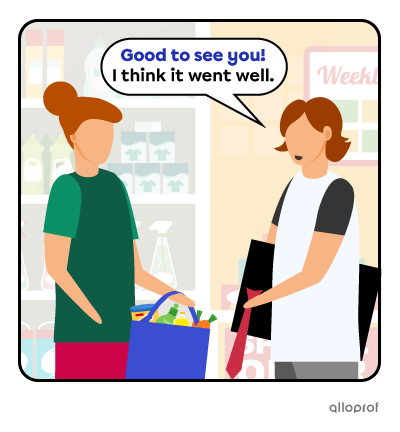
Identifications are used to introduce and ask about another person or yourself. Identifications are often used with greetings.
| My name is . . . |
| I’m . . . |
| Let me introduce myself, I’m . . . |
| I don’t think we’ve met. I’m . . . |

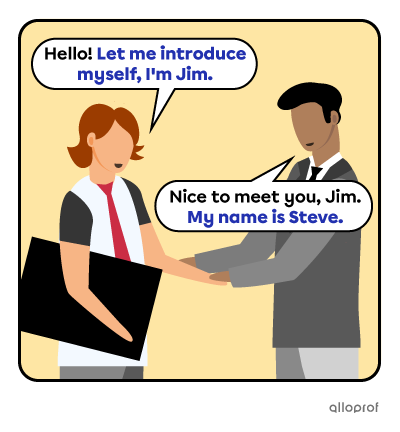
| This is . . . |
| Meet . . . |
| This is my friend . . . |
| Let me introduce you to . . . |
| I’d like you to meet . . . |
| Have you met . . . |

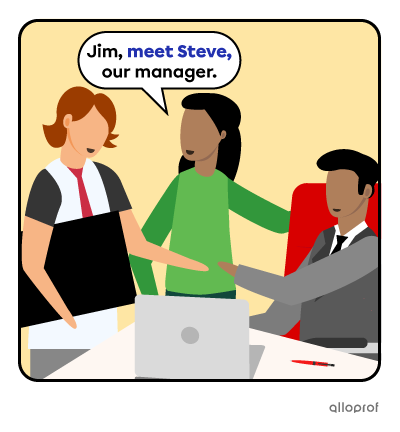
| What is your name? |
| Who is . . .? |
| And you are . . .? |
| Which group are you in? |
| Who’s your partner for the project? |

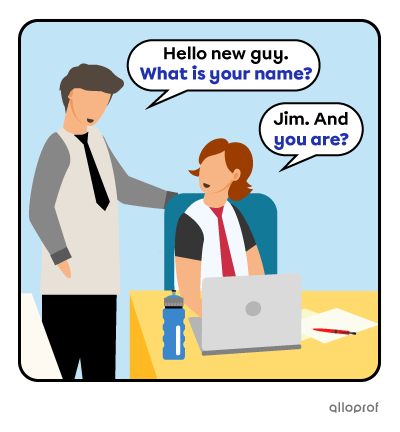
Goodbyes are used at the end of conversations, to close it.
| Formal | Informal | |
| Goodbye | ✔ | ✔ |
| Bye | X | ✔ |
| See you later | X | ✔ |
| Have a good day | ✔ | ✔ |
| See you tomorrow | X | ✔ |
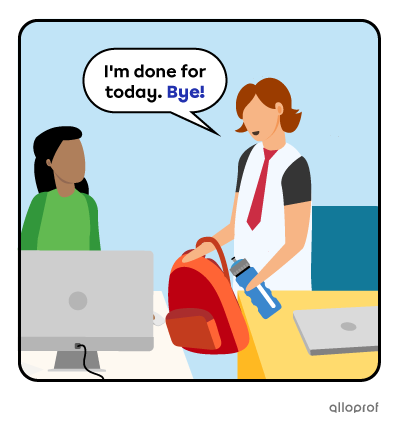

Formal goodbyes are used when ending a conversation with people you don’t know very well and in official settings.
| Enjoy your evening |
| I must be going |
| I have got to go |
| It was nice meeting you |
| It was nice talking to you |
| It was a pleasure |
| It was a pleasure meeting you |
| The pleasure was mine |
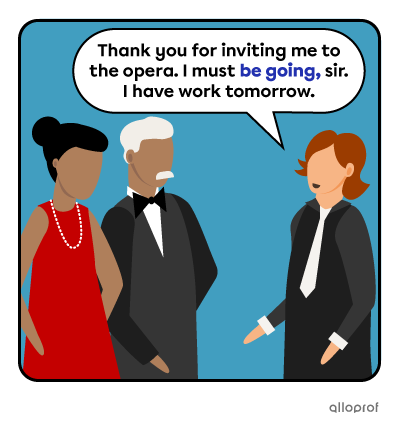
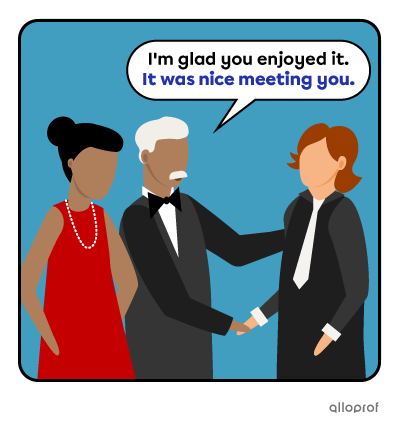
Informal goodbyes are used to end casual conversations with people you know very well.
| Bye bye |
| Take care |
| Good night |
| Okay, thanks |
| Until next time |
| See you |
| Talk to you later |
| Have a good one |
| Gotta go |
| Take it easy |
| Catch you later |
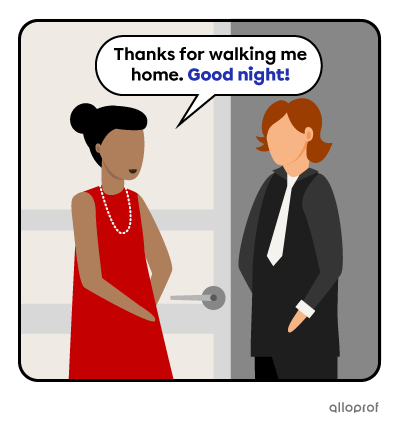
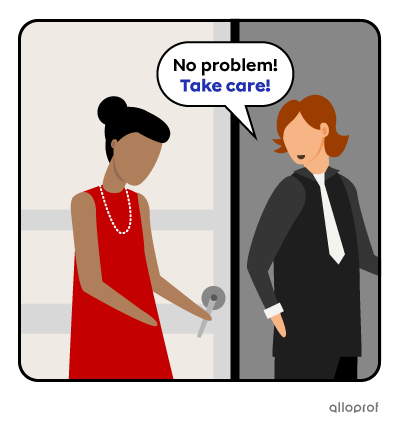
Goodbyes are often used in combination by using 2 expressions together. The most common combinations are done by adding a phrase to the words Goodbye or Bye. It can be added before or after.
| Adding before: | Adding after: |
| See you later, goodbye! It was nice meeting you, goodbye! |
Goodbye, see you later! Goodbye, it was nice meeting you. |
| See you tomorrow, bye! Have a good day, bye! |
Bye, see you tomorrow! Bye, have a good day! |
Thanks are used to express gratitude, appreciation and recognition. Thanks can be given or accepted.
| Thank you |
| Thank you very much |
| Thank you so much |
| Thanks |
| Thanks a lot |
| Thanks for everything |
| I owe you |
| I owe you one |
| I’m so grateful |
| Much appreciated |
| You’re a lifesaver |
| You’re the best |
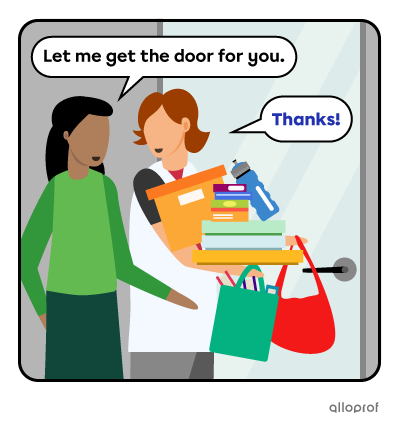
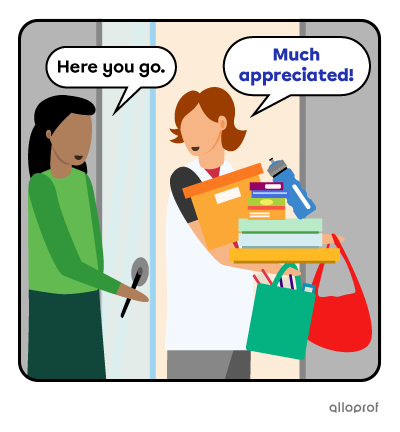
| You are most welcome |
| You’re welcome |
| Welcome |
| It’s my pleasure |
| My pleasure |
| The pleasure’s mine |
| That’s okay |
| Anytime |
| Glad to help |
| Not at all |
| Just doing my job |
| Don’t mention it |
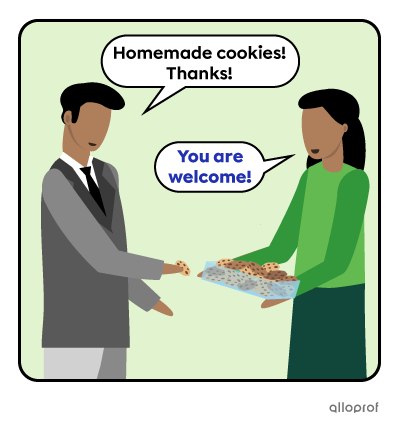
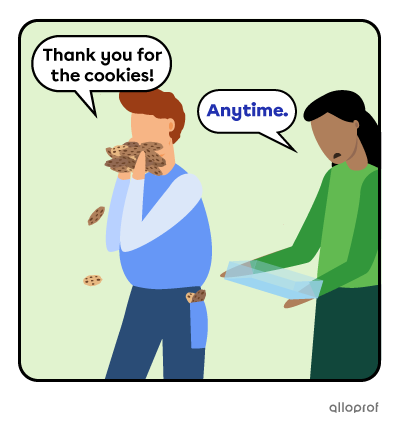
Apologies are used to express regret, to say you are sorry and to ask for forgiveness.
| I’m sorry |
| Sorry |
| I apologize |
| My apologies |
| Please, accept my apologies |
| Please, forgive me |
| Forgive me |
| Excuse me |
| Pardon me |
| I didn’t mean to . . . |
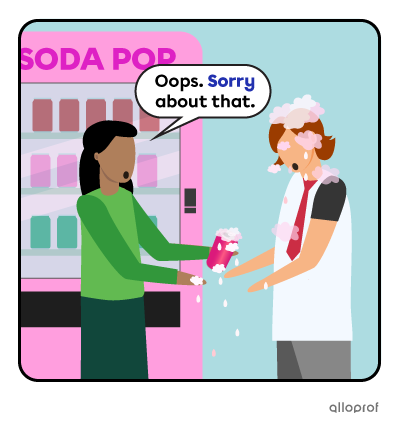
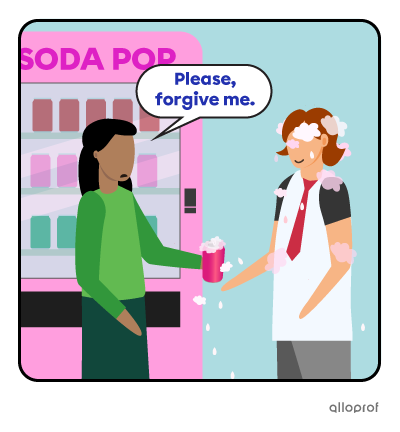
| That's okay |
| It’s okay |
| That's alright |
| It’s alright |
| Don't worry about it |
| Don't mention it |
| Don't apologize |
| Forget about it |
| It doesn't matter |
| No harm done |
| No need to apologize |
| Never mind |
| You couldn't help it |
| I quite understand |
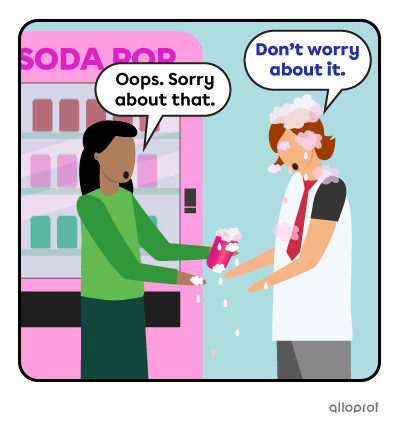
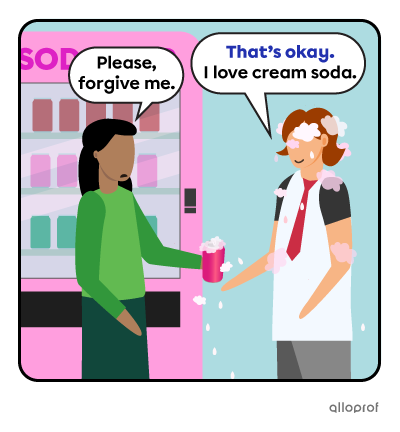
Interruptions are used when you need to say something and someone is busy or already talking.
| Excuse me |
| I’m sorry to interrupt |
| Pardon me |
| Pardon me for interrupting |
| Can I interrupt? |
| I’m sorry about this, but . . . |
| Before you continue . . . |
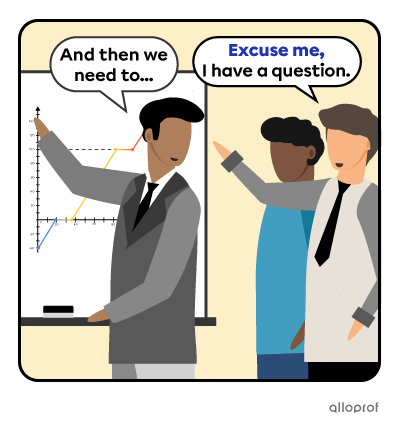
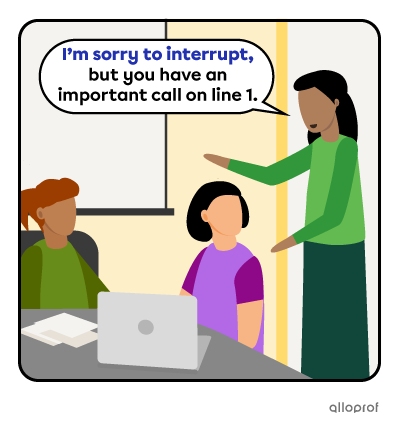
Fillers are used to get more time to think or react to what was said.
| I mean . . . |
| I think . . . |
| All right . . . |
| Well . . . |
| Let’s see . . . |
| I’ll think about it . . . |
| I’m thinking about it . . . |
| Let me think about it |
| Hold on a second |
| Can I have a minute? |

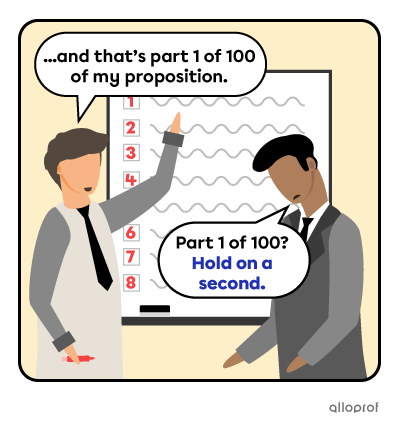
Warnings are used to warn people of a situation or an upcoming situation.
| Be careful! |
| Watch out! |
| Look out! |
| You’d better . . . |
| I wouldn’t do that if I were you |

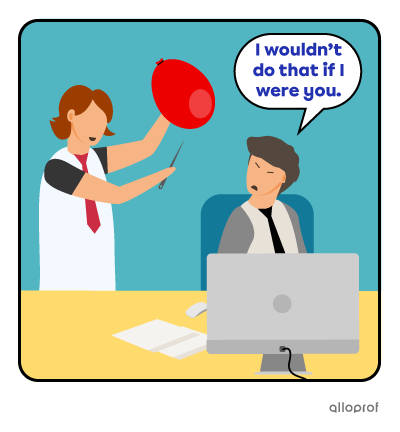
Reassurances are used to comfort, reduce worry and generally support people.
| You’ll be fine |
| It will be alright |
| The same thing happened to me |
| It’s not important |
| It’s okay |
| No problem |
| Don’t worry about it |
| That’s all right |
| It doesn’t matter |
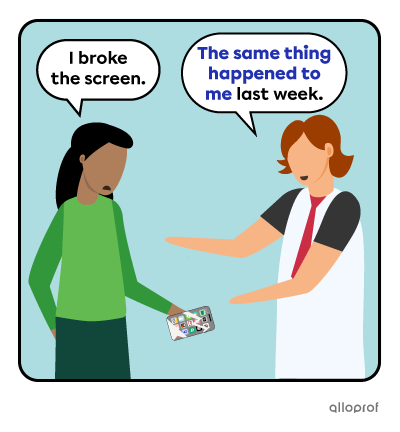
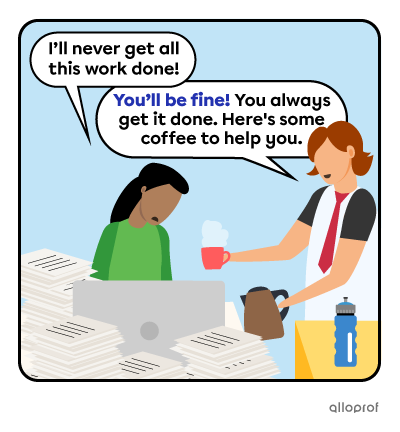
Phone conversation phrases are used to call, answer, reply and take messages.
| Answering a Personal Call |
| Hello? |
| Good morning! |
| Good afternoon! |
| Answering the Phone at Work |
| Hello, this is . . |
| Jenna speaking. |
| Alloprof, how may I help you? |
| Alloprof, Jenna speaking. How may I help you? |
| Thank you for calling Alloprof. How can I help you? |
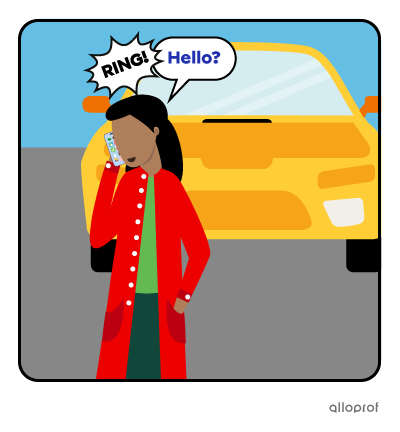
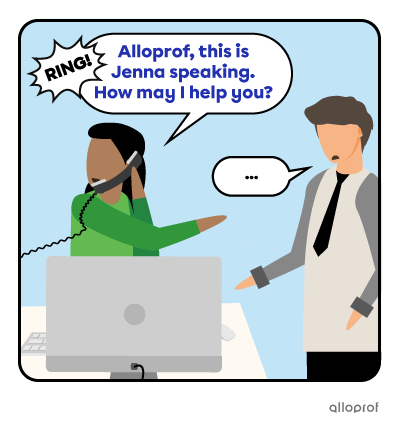
| Hello, may I speak to Steve? |
| Hello, I would like to speak to Steve, please. |
| Hi, can I talk to Steve? |
| Hi, is Steve there? |
| Hi! Steve, please. |
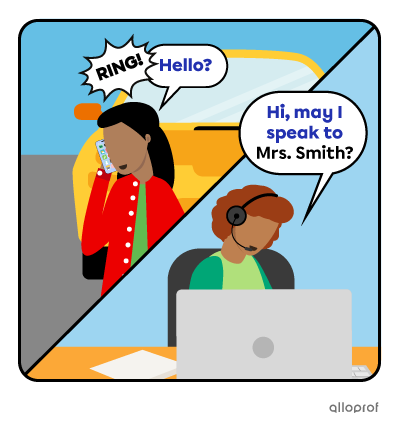
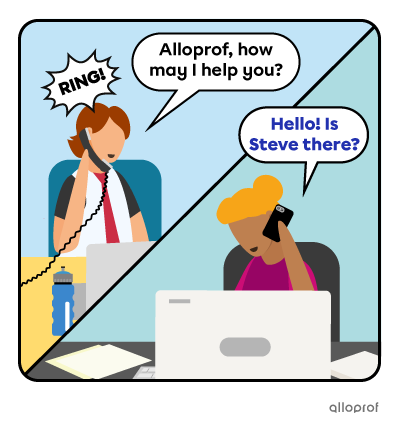
| Replying to a personal call: |
| Yes, it’s me. |
| Speaking. |
| Sorry, you have the wrong number. |
| Replying to a call at work: |
| One moment please. |
| One minute please. |
| Yes, it’s me. |
| Please hold. |
| I’ll place you on hold. |
| I’ll transfer you. |
| I will connect you right away. |
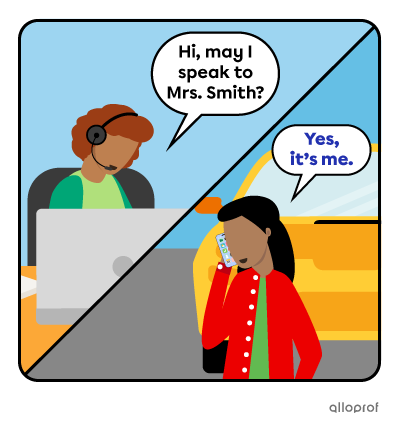
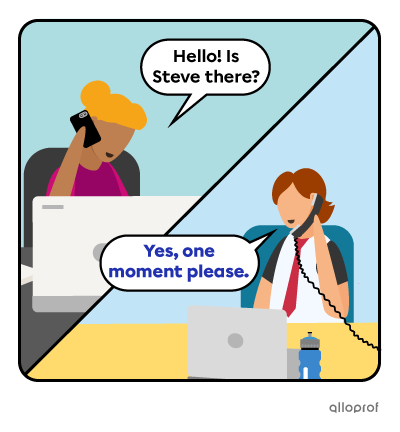
| Hello, I’m calling about . . . |
| Hello, I’d like some information about… |
| Hello, could you tell me . . .? |
| Hello, I was wondering if you could . . . |
| Hi! Can you help with . . .? |
| Hi! Can you tell me . . .? |
| Hello! I have a question about… |
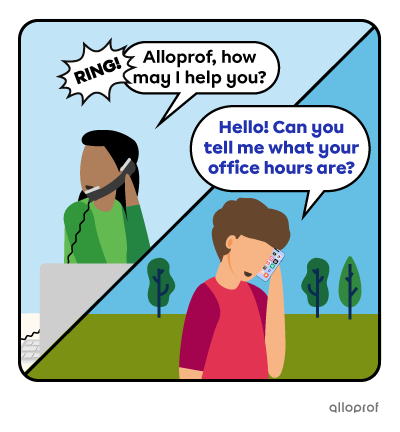
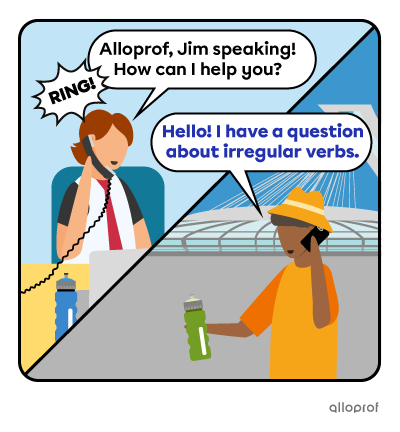
| May I take a message? |
| Would you like to leave a message? |
| He’s not available. Do you have a message? |
| Sorry, she’s not here. Can I give her a message? |
| May I ask who’s calling? |
| What is your number? |
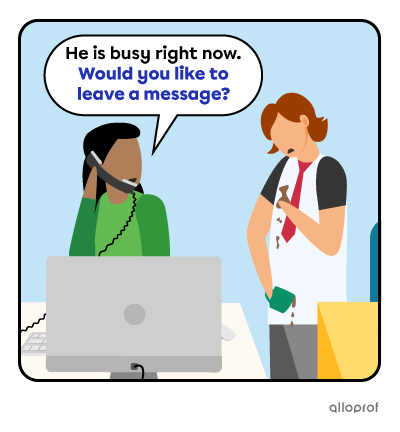
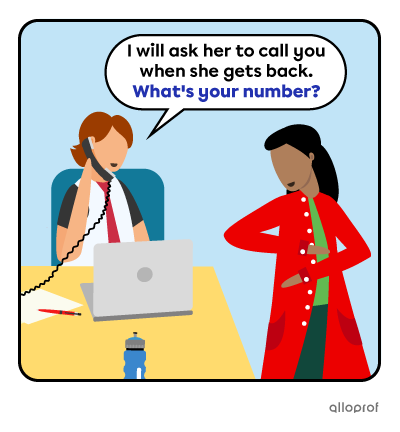
| This is Ray. Can he call me back at 555-2368? |
| Yes, can he call me back? |
| Ask him to call me back. |
| My name is . . . |
| This is . . . |
| My number is . . . |
| You can reach me at . . . |
